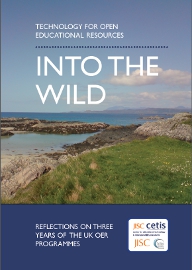Reflections on three years of the UK OER Programmes.

Between 2009 and 2012 the Higher Education Funding Council funded a series of programmes to encourage higher education institutions in the UK to release existing educational content as Open Educational Resources. The HEFCE funded UK OER Programme was run and managed by the JISC and the Higher Education Academy. The JISC CETIS “OER Technology Support Project” provided support for technical innovation across this programme. This book synthesises and reflects on the approaches taken and lessons learnt across the Programme and by the Support Project.
This book is not intended as a beginners guide or a technical manual, instead it is an expert synthesis of the key technical issues arising from a national publicly-funded programme. It is intended for people working with technology to support the creation, management, dissemination and tracking of open educational resources, and particularly those who design digital infrastructure and services at institutional and national level.
Availability
Published by University of Bolton, Deane Road, Bolton, BL3 5AB
ISBN: 978-0-907311-35-5 (print on demand: book (£3.36) printed by Lulu; or free pdf to print yourself)
ISBN: 978-0-907311-36-2 (ebook, Kindle: free download; or from Amazon (77p))
ISBN: 978-0-907311-37-9 (ebook, ePub: free download)
ISBN: 978-0-907311-38-6 (ebook, pdf: free download)
(All prices are the minimum for the distribution channel)
Licence and source
 Into the wild – Technology for open educational resources by Amber Thomas, Lorna M. Campbell, Phil Barker and Martin Hawksey (Eds) is licensed under a Creative Commons Attribution 3.0 Unported License.
Into the wild – Technology for open educational resources by Amber Thomas, Lorna M. Campbell, Phil Barker and Martin Hawksey (Eds) is licensed under a Creative Commons Attribution 3.0 Unported License.
You are free to share (to copy, distribute and transmit the work) to remix (to adapt the work) and to make commercial use of the work under the proviso that you attribute the origin of the work (if possible please include the title, the names of the editors / authors and a link to this page).
To help you re-use this work editable formats are available. We originally wrote the book using the BookType, an online collaborative authoring and publishing platform. Booktype will allow you to clone our source, contact Phil Barker if you would like to do so. There is also a Word .docx file that we used for the final published versions.
Errors and bugs?
There are some minor bugs in some versions: bullet points don’t display well on the kindle version, reference links are erratic on the ePub version (more for some readers than others), the images on the print pdf have white lines on them. We hope none of these are serious problems for you. If you do find a serious problem please contact Phil Barker.


